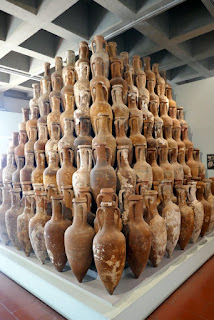Today, half of our travelers group got hit by apparent food poisoning -- all had eaten together with different meals -- and they stayed in at the hotel. I have been there and it is awful to feel yucky AND miss interesting things to do.
We headed out to a tour of the Archeology Museum, looking at history here starting from the Neolithic Age (about the same time frame as in Malta) to the 1500s. Again, many layers of population built on top of their forebearers. Our guide helped us see those layers. It was one of the best ancient history tours I have had.
 |
| The pointed arches are from the Ottoman era. |
 |
| Looking out sort of a port hole to the harbor. |
 |
| This area of the museum was used as a prison during WWII. Now the cells have art installations. |
 | |
| With the exception of the round Greek altar, this was a neolithic living area. |
There was lots of pottery that I took photos of, but realized it would be overwhelming here. These are some highlights.
 |
| This was a ceramic jewelry case. |
 |
| Several sarcophogi were moved from the necropolis to the location on the museum grounds to make room for the living |
 |
| Early forms of safety pins |
 |
| Grave goods of gold. Very flimsy, but apparently a way to let the gods know this was a VIP who deserved better treatment than normal folks. |
 |
| An early coin |
 |
| The blue color in this container is made from lapis lazuli, which was expensive then, hinting at the wealth among the island inhabitants. |
 | |
| This shows how amphorae were positioned in a ship. I always wondered why these containers didn't have flat bottoms. The boards they were set into had indentations to receive the amphorae. |
 |
| The wooden pieces between the jars helped stabilize them. |
 |
| Stacking them in pyramid shapes was also effective. The ones here were all found with shipwrecks. |
 |
| A remnant of the Norman castle and church |
 |
| A more baroque church with a highly decorated ceiling replace the narrower Norman church. |
Afterwards, I visited an artist who had work that might have been fine for my home, but was much more expensive than I was prepared for. I got a Sicilian salad for lunch at Di Pina, where we visited yesterday... it was at least as good as I anticipated. And I spent the afternoon reviewing photos and updating 3 of my posts, so now I am only one day (soon to be two because it is bedtime) behind.
At 6pm, we drove across the island to Aeolian House for dinner. The food is cooked in a restaurant here by the son of the owner and served cold there. We got a chance to look at a typical Aeolian home and see the sunset before our ride back to Lipari.
 |
| Our sunset. If you look at my Facebook cover photo, you will see that I had to reverse the photo so that the profile picture didn't overlay me in the cover photo. |





No comments:
Post a Comment